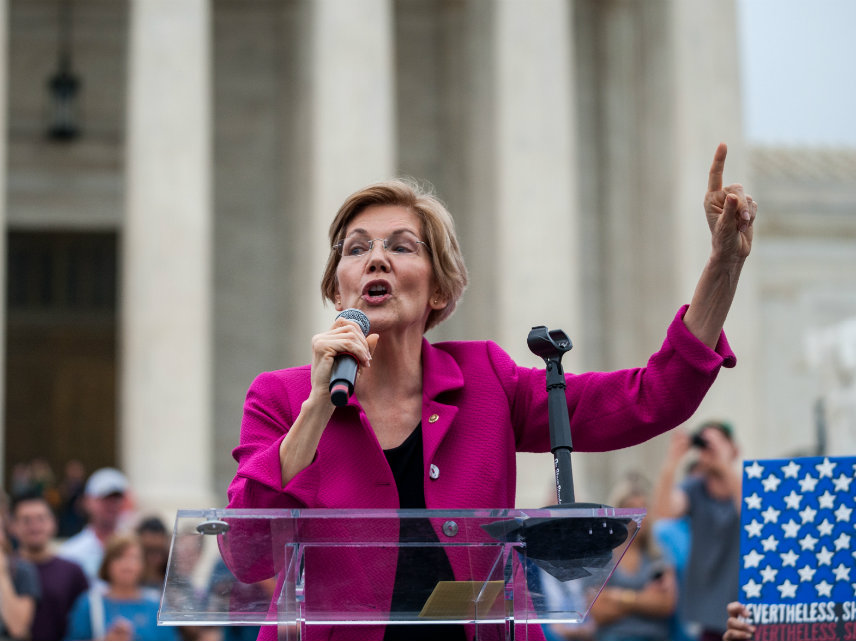Elizabeth Warren Challenges Trump's Protectionist Tariffs for Not Being Protectionist Enough
Warren is criticizing a fundamentally unfair process, but only because she wants the outcomes to be slightly different.

Artificially hiking the price of steel and aluminum is bad enough, but one of the really galling parts of the Trump administration's tariff policy is the Commerce Department's process for determining which businesses are exempt from paying these import taxes. As I've written before, the so-called "tariff exclusion process" is opaque, confusing, completely lacking in due process, and infested with cronyism.
It's good to see some members of Congress calling out the administration for this mess. That's what Sen. Elizabeth Warren (D–Mass.) does in a letter sent Wednesday to Commerce Secretary Wilbur Ross, the guy who is supposed to be overseeing the tariff exemptions.
Unfortunately, a significant part of Warren's letter makes the argument that what's needed is more protectionism, not less.
"You appear to be implementing the tariff exemption program in a way that undermines American steel producers—by allowing large tariff-free imports of foreign steel—and harms American-owned steel-dependent companies instead of improving their competitive advantage over companies headquartered in China and other foreign countries," Warren writes. Specifically, she says granting tariff exemptions to Chinese- and Japanese-owned companies with U.S. subsidiaries constitutes "a major loophole."
When the steel and aluminum tariffs were implemented in March, Ross promised that the department would operate a "fair and transparent process" to determine which businesses should be exempt from the tariffs. According to the government's websites outlining the tariff exclusion process for steel and aluminum, the exemptions would be granted for businesses that could demonstrate that there was not adequate domestic supply of the type of steel or aluminum they needed. There is virtually no information about who is deciding which exemptions get granted, or why, or how. It leaves the impression that the department is trying to make a high-stakes game that's full of political influence look like a rote bureaucratic operation.
Problems with the process emerged almost immediately. Businesses have complained to congressional committees about a lack of transparency from the Commerce Department, about the inability to appeal the Commerce Department's decisions, and about the influence exerted by American steelmakers on the outcome of exemption applications.
"No forum is provided for interaction with those determining the merits of either the petitioners' or the objectors' arguments," Willie Chiang—vice president of Plains All American GP, a Texas-based pipeline company that's been on the losing end of the exemption process—told the House Ways and Means Committee in July. "In addition, there is no opportunity to respond to objections—even if the objections contain incorrect information."
Some Republican lawmakers, including House Ways and Means Committee chairman Kevin Brady (R-Texas), and Sen. Ron Johnson (R-Wis.) have criticized the exemption process and called for changes, seemingly to no avail.
As of mid-October, the Commerce Department had received more than 30,000 steel tariff exclusion requests, and approved about 11,000 of them. Warren's staff analyzed the first 909 decisions posted, and found that 81 percent of the exemptions granted were awarded to companies headquartered outside the United States. More than half of those exemptions were awarded to Japanese-based businesses and more than 80 percent to Chinese- and Japanese-owned businesses, she says in the letter to Ross.
"How is this outcome," she asked, "consistent with President Trump's claims that the tariffs and the tariff exemption process were designed to help American steel producers and users?"
Let's be clear: The exemption process is a horror show. It's fundamentally unfair to have government officials in Washington, D.C., deciding that one company has to pay an additional 25 percent for imported steel while some of its competitors are able to avoid those added taxes. The fact that those decisions are made without any recourse or due process is more infuriating still.
But the problem isn't that the majority of the exemptions are going to foreign-based firms. At most, that's a symptom of the issues created by the tariffs and the tariff exemption process. If the majority of the exemptions were granted to American firm, the process would be just as broken.
Warren's letter leaves the impression that she thinks the Commerce Department is being too lenient about granting exemptions. But short of repealing the tariffs entirely, the best possible outcome would be for Congress to instruct the department to approve all exemption applications, regardless of whether they come from American-owned or foreign companies. Her complaint that the Trump administration is not doing enough to favor American firms over foreign competitors is not a criticism of the tariffs themselves; it's an indication that Warren would have no qualms with the president wielding those same powers as long as they were applied in a slightly different way.
Politically, this is an attempt to beat the Trump administration at its own game. That might be politically useful for Democrats who want to wrestle blue-collar voters away from Trump. Indeed, one way to look at Warren's letter is as a trial balloon for how to attack Trump's tariffs in 2020. But it ends up being an argument for more protectionism, and it essentially turns the tariff debate into a question of which side can promise to erect more barriers to foreign imports. That's a debate in which America loses, no matter which party wins.


Show Comments (26)